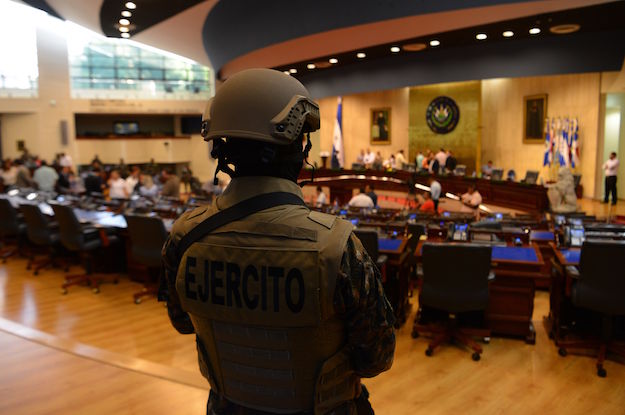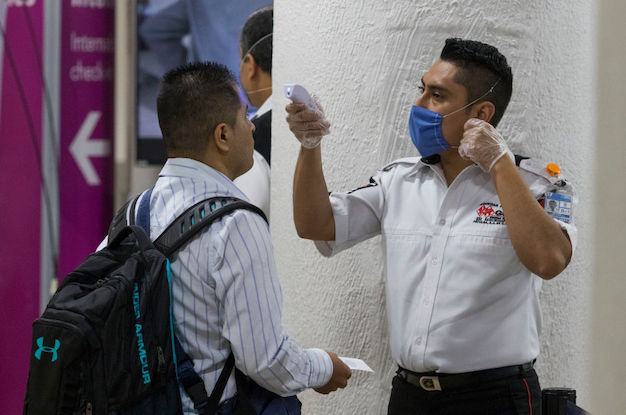It’s an image we’ve seen repeatedly throughout Latin America since October: Presidents surrounding themselves with stern-faced soldiers to project power and strength during moments of rising social unrest.
But there’s reason to believe this latest episode in El Salvador was different from the previous ones in Peru, Bolivia and elsewhere that we chronicled in our latest issue of Americas Quarterly. When Nayib Bukele, the popular 38-year-old president of El Salvador, marched into a special session of Congress on Sunday accompanied by several dozen heavily armed soldiers and police officers, it was a brazen effort to intimidate and bend the chamber to his will.
Bukele was angry at lawmakers for dragging their feet in the passage of an anti-crime bill. “I think it’s very clear who has control of the situation,” he said, as the soldiers with rifles looked on.
It’s tempting to dismiss El Salvador as exceptional – a small, long-troubled country of just 6 million in Central America’s Northern Triangle. But the trends there – a charismatic president empowered by social media, a Congress controlled by decaying parties at odds with the executive, and a population angry over corruption and crime and not particularly concerned with democratic rules – are present in many countries around the region.
To make sense of these events, and the possibility of further contagion, I recently spoke with two of the United States’ most seasoned observers of Latin American affairs. Frank Mora is the director of the Latin American and Caribbean Center at Florida International University, and he also served as deputy assistant secretary of defense for the Western Hemisphere during the Obama administration. Roberta Jacobson is a senior advisor at Albright Stonebridge Group, and was a longtime U.S. diplomat and the ambassador to Mexico from 2016 to 2018.
Our conversation, edited for length, is below.
—
Winter: Frank, in AQ’s latest special report, you wrote that “it’s not the 1970s again for Latin America’s militaries.” Why is today’s trend different and is that true for El Salvador?
Mora: The military in the 60s and 70s took the initiative of assuming power in periods of social turmoil. It was their idea. What we’re seeing today is different. They’re kind of being dragged into playing a larger role in society and politics.
But the latest case in El Salvador is something markedly different than what we’ve seen in the past 20 years. We saw the military there in the well of the legislative assembly trying to intimidate the legislature under the direction of President Bukele to pass a law that he wants approved. That, I think, in some ways is different from what we’ve seen in the past few years. I hope it’s not a trend.
Winter: Roberta, were you surprised by what you saw in El Salvador?
Jacobson: I was stunned. I thought the images were incredibly startling for those of us who have focused on the hemisphere for quite a while. It was so brazen. Yet there was not the kind of outcry, whether from the rest of Central America or the hemisphere – in part because you have someone like Bukele who’s got something like a 90% approval rating and who talks to people directly on Twitter.
It does remind me of a continuation of trend. My sense has always been that in the 60s and maybe early 70s, even when it looked like the military was acting on its own initiative, it was often because they were being motivated by a segment of the civilian population. And in the case of El Salvador, that segment of the civilian population is the president. That’s part of the problem at a glance here: how the military is used by civilians.
Winter: In Peru and Chile and Ecuador, we had these images of presidents addressing the nation on television with soldiers standing in the background. This was a clear effort to show power and legitimacy. Was El Salvador really that different?
Mora: I think it’s different, but how significant a difference there is, we’ll have to see. I think at the end of the day this whole trend is a crisis of democracy. This is really not about the institutions seeking political power or some economic gain. They’re being dragged in, in many ways reluctantly, because their civilian leaders are incapable or unwilling of governing and meeting people’s expectations. The danger is that this could be a slippery slope. If democracies can’t deliver and do the reforms that are necessary, one could plausibly expect the militaries to play a larger role.
Winter: Doesn’t it seem like we learned all these lessons in the 20th century about why it’s bad to have the military involved in politics? Is that what’s happening here – that there are generations getting older that can’t remember what it meant to have the armed forces in charge?
In Brazil, for example, there is a belief that the military is less corrupt, more competent and more patriotic than civilians. Polls show that younger people are more likely to believe this, while older generations are far more skeptical.
Jacobson: Because they lived through it. There is a generational split. There is a clearly a greater likelihood or a greater dissatisfaction with democracy among those who have not experienced life except under democracy. So this problem could grow more acute over time because the generations that have lived through military governments – numerically those numbers going to go down as that generation ages and dies.
Younger people seem to be more disillusioned with their democracies. So they’re looking for an institution that appears – emphasis on appears – to demonstrate discipline, hierarchy and effectiveness. Right now, as they look around, that’s the institution that they see as representing those values.
Winter: So where is all this headed? Where do you think we’re going over the next three to five years? Do you think we’re going to continue to see societies looking to the military for solutions?
Jacobson: I tend to be pretty pessimistic across the hemisphere except in a couple of cases where I think political leaders seem chastened. (Sebastián) Piñera in Chile, who I think was tone deaf at the beginning of the crisis there, is moving ahead with his reforms…
Winter: I hate to interrupt, but his popularity is like 5%. So anybody reading may think, “Wow Piñera is the example she cited first?”
Jacobson: He has nowhere to go but up. He’s responding to a need to focus on the institutions and on anti-corruption measures. Now whether it’ll be enough, or whether it’ll be seen as a legitimate process, is not yet clear.
Mora: I think, to your question, Brian, that we’re not going to see the sort of military coups or interventions like we saw in the past, but we will see leaders who want to use the military for their own political purposes, because it gives them more credibility and more prestige in some cases. In El Salvador, we haven’t seen polling, but I suspect that if you were to take a poll of Salvadorans today and asked them what they thought about what Bukele did, you could very well get 60% or 70% of the people’s support. That concerns me.
Winter: Final question. If you were a civilian leader in the region watching happened in El Salvador and trying to do the right thing – maybe a Duque in Colombia or an Alberto Fernández in Argentina or even maybe an AMLO in Mexico – what would you do?
Jacobson: To me it seems, in some respects, clear. Not easy, but clear. Which is to say, you need to aggressively move forward on your internal watchdogs, on your inspectors general, on your offices of professional responsibility, with the police, on your judiciary. You need to demonstrate your willingness to clean things up in your own house, in the civilian institutions. I think that is one of the best ways to inspire greater confidence in civilians and that includes firing people if you need to.
Mora: I completely agree. I would add to that the international dimension. Unfortunately, I was disappointed with (OAS) Secretary General (Luis) Almagro’s response to what occurred in El Salvador. He seemed to tolerate what occurred. There has been a sort of decline of the Inter-American Democratic Charter and other norms and institutions that were there to protect democracies, whether they were threatened by military interventions or by elected leaders trying to pervert those democratic institutions. That is another loss of a brake that I think will not bode well for some of the things we just talked about.









